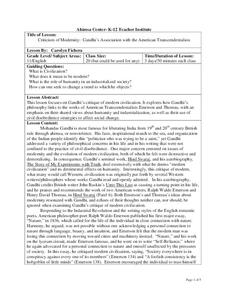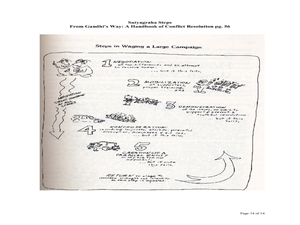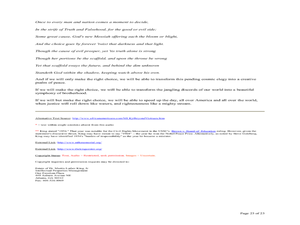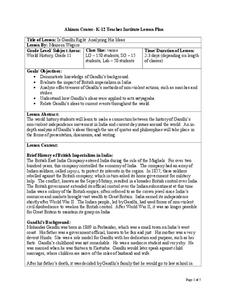Curated OER
Gandhi on Poverty, Violence, and Well-Being of All
Eighth graders explore the concept of Sarvodaya. In this nonviolent resistance lesson, 8th graders listen to a lecture about Gandhi's teachings and determine how poverty is a form of violence.
Curated OER
Criticism of Modernity: Gandhi's Association with the American Transcendentalists
Eleventh graders explore Gandhi's philosophy links to the works of American Transcendentalists Emerson and Thoreau. In this transcendentalism instructional activity, 11th graders discuss essential questions about civilization and modernity.
Curated OER
Gandhi's Alternate View of Women: Changing the Face of Modern Media & Advertising
Eleventh graders analyze the violence of media and advertising on women, as well as Gandhi's views of women. For this women and media lesson, 11th graders Killing Us Softly and Tough Guise as an analysis of media and advertising and...
Curated OER
Gandhi's Non-violent Revolutions: Examining Tools to Make Non-violent
Students analyze Gandhi's philosophy of nonviolent social change. In this nonviolence and social change lesson, students research a leader from the attached list who practiced nonviolent social change. Students write their own poem...
Curated OER
Tracing the Idea of Civil Disobedience through Thoreau, Gandhi, and King
Students analyze civil disobedience through history studying Thoreau, Gandhi, and Dr. King. In this civil disobedience lesson, students read and analyze excerpts from Thoreau, Gandhi, and Martin Luther King. Students demonstrate their...
Curated OER
Gandhi Speaks Through Clothing
Middle schoolers analyze how Gandhi used the way he dressed to communicate with the Indian people. Students understand why Mahatma Gandhi was such an effective leader of the Indian struggle for independence from British colonial rule
Curated OER
Gandhi's Salt March, A Simulation
High schoolers examine Gandhi's Salt March. In this peace and tolerance lesson plan, students discuss the Salt Tax Levy that was imposed in India. High schoolers then debate how the Indian National Congress should have handled the issue.
Curated OER
Journey to Synergy on the path of Gandhi and King
Students explore the concept of synergy. In this peace and tolerance lesson plan, students read sections of The 7 Habits of Highly Effective Teens by Covey and then discuss how Gandhi and King mastered the art of synergy. Students then...
Curated OER
Gandhi's "Good Life"
Eleventh graders use a Gandhian lens to analyze critically materialism in a capitalist society. In this Gandhian philosophy activity, 11th graders cultivate awareness, explore materialism and sustainability, examine the idea of 'what is...
Curated OER
Muhammad Ali and his Vietnam War Resistance: Defining Nonviolent Action through Gandhi and King
Students research Muhammad Ali's act of civil disobedience. In this civil disobedience lesson plan, students research Ali's defiance of the Vietnam War draft and compare his reasoning to Martin Luther King's thoughts on the war. Students...
Curated OER
The Art of Nonviolence: Martin Luther King, Jr., Gandhi, and Concepts of Nonviolence in Indian Art
Students make connections between nonviolent ideals and art. In this visual arts lesson, students discuss the successes of the American Civil Rights Movement and discuss Gandhi's influence on the movement. Students then examine images of...
Curated OER
Gandhi’s 12 Vows: Training Warriors of Non-violence
Students examine Gandhi’s ‘Walk n Talk’ strategy. In this lesson on civil disobedience, students evaluate Gandhi’s non-violent method of satyagraha as an effective mode of revolution.
Curated OER
Satyagraha in Daily Life
Eighth graders explore the concept of satyagraha. In this Mohandas Gandhi lesson, 8th graders read a story titled, "Satyagraha," and discuss the application of the Gandhi's method in the world today.
Curated OER
Using Mahatma Gandhi's Swaraj and Satyagraha Ideals in the Classroom
Young scholars write definitions of swaraj and satyahraha as presented by Mahatma Gandhi, and how they pertain to them in the classroom. In this Gandhi lesson plan, students determine the rights and responsibilities they have and how to...
Curated OER
Non-Violence Means "Doing Nothing"
Students reflect on violence and non-violence. In this World History lesson, students read an article by Gandhi then write an essay as to whether they agree or disagree with his thoughts. Students then share all their ideas as a class.
Curated OER
The Roots of Ahimsa
Students investigate the philosophy of nonviolence. In this Ghandi activity, students discover that Gandhi inspired many civil rights leaders with the idea of ahimsa. Students complete venn diagrams, create timelines, and discuss reading...
Curated OER
Religion in Social Change: What's God Got To Do With It?
Students determine how religion influences social change. In this religion and social change activity, students examine how the religious beliefs of Mohandas Gandhi and Martin Luther King, Jr. were inspirational as they worked to reduce...
Curated OER
Free India: Resisting British Rule in India
Students explore the impact of nonviolence during Gandhi's Free India movement. In this World History instructional activity, students complete several activities including research, class discussions and a multimedia project, all...
Curated OER
Is Gandhi Right: Analyzing His Ideas
Young scholars explore the connection between Gandhi and the Independence Movement in India. In this lesson on social change, students examine the ideas of Gandhi to analyze non violent change. Young scholars consider the impact of...
Overcoming Obstacles
Identifying Emotions in Conflicts
The takeaway from the second lesson plan in the Resolving Conflicts module is that "conflict is like an iceberg" in that we only see a small portion of what's involved in conflicts. Participants learn to identify the many unseen feelings...
Curated OER
Gandhi's Life and Guiding Principles
Second graders investigate philosophy by researching the life of Mahatma Gandhi. In this biographical lesson, 2nd graders listen to a reading of the book "Gandhi" and make a character map of his actions, feelings and thoughts. Students...
Curated OER
Gandhi's "Good Life": The Spiritual Dimension
Students investigate awareness and spiritual transformation by researching the life of Gandhi. In this philosophy lesson, students discuss living in an aware state by practicing yoga, eating vegetarian, and becoming immersed in poetry....
Curated OER
Consumer Confusion: Wants versus Needs and Gandhi's Wisdom
Fourth graders create graphs to illustrate consumer consumption throughout the world. In this consumer lesson plan, 4th graders also discuss wants and needs around the world, and consider Gandhi's opinion on material possessions as they...
Curated OER
Human Rights And Civil Rights
While he may not be as well known as civil rights activists such as Mahatma Gandhi, Dr. Martin Luther King, or Malcolm X, Ralph Bunche's contributions certainly made him a leader in the struggle for civil rights in the United States and...

























